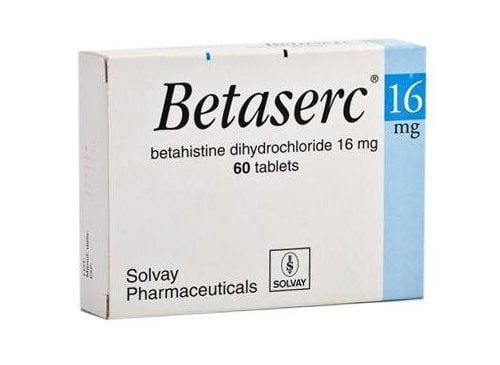1. What is Merislon?
Merislon contains the active ingredient Betahistine mesilate - a substance similar to histamine, found naturally in the human body.
Merislon has a direct stimulating effect on H1 receptors located on blood vessels in the inner ear. It acts on the precapillary sphincter in the blood vessels of the inner ear. Thereby reducing the pressure in the endolymphatic space.
In addition, Merislon has a strong antagonistic effect on H3 receptors and increases the level of neurotransmitters released from nerve endings. The increase in the amount of histamine released from histaminergic nerve endings stimulates H1 receptors, increasing the direct active effect of Merislon on H1 receptors. Therefore, Merislon strongly dilates the inner ear and is used in the treatment of vertigo.
The combination of the above effects, Merislon is indicated for the treatment of Ménière's syndrome. This syndrome is characterized by the following signs: dizziness, tinnitus, nausea, headache, and hearing loss. The effectiveness of Merislon may be due to its ability to regulate the circulation of the inner ear or due to its direct effect on the nerve cells of the vestibular nucleus.
Merislon is prepared in the form of tablets with a content of 6mg or 12mg.
2. Uses of Merislon
Merislon is indicated for the treatment of symptoms related to Ménière's syndrome such as hearing loss, tinnitus, dizziness, and nausea.
3. How to use - Dosage of Merislon
3.1. How to use
• Patients need to swallow the whole Merislon tablet with a glass of water, absolutely do not chew, crush or break the tablet.
• Merislon should be taken with meals because the drug causes mild stomach problems.
3.2. Dosage
The dosage depends on the condition, the doctor will prescribe the appropriate dose for each patient. The use of Merislon for treatment can be long-term and last for several months.
In adults:
• Initial oral treatment is 6 to 12 mg, three times a day, preferably with meals.
• Maintenance dose: 24 - 48 mg per day. The daily dose should not exceed 48 mg.
Children and adolescents:
• Merislon tablets are not recommended for use in children and adolescents under 18 years of age due to a lack of data on safety and efficacy.
What to do if you miss a dose of Merislon?
• The patient should take the missed dose as soon as he remembers. If it is close to the time for the next dose, skip the missed dose and take the next dose as directed.
• Do not double the dose of Merislon to make up for a missed dose.
What to do if you overdose on Merislon?
• A few cases of overdose have been reported. Some patients experienced mild to moderate symptoms with doses up to 640 mg (such as nausea, drowsiness, and abdominal pain). Other symptoms of Merislon overdose include vomiting, indigestion, and convulsions. More serious complications (such as pulmonary or cardiac complications) have been observed in cases of intentional overdose of Merislon, especially when combined with other drugs that have also been overdosed.
There is no specific antidote. Gastric lavage and symptomatic treatment of overdose when using Merislon is recommended within one hour of ingestion.
4. Contraindications of Merislon
Merislon is contraindicated in the following cases:
• Patients who are hypersensitive to Betahistine mesylate, or any excipients in Merislon.
• Merislon is contraindicated in patients with phagocytic tumors. Because betahistine is a synthetic analog of histamine, it can cause the release of catecholamines from the tumor, leading to severe hypertension.
5. Side effects of Merislon
When using Merislon, the following unwanted effects may occur:
• Vomiting, nausea, severe abdominal pain, drowsiness.
• Rare allergic reactions
6. Notes on using Merislon
6.1. Pregnancy
There is insufficient data on the use of Merislon in pregnant women. Animal studies, although insufficient, do not indicate direct or indirect harmful effects concerning reproductive toxicity at clinically relevant therapeutic exposures. The potential risk for humans is unknown. As a precautionary measure, it is best to avoid the use of Merislon during pregnancy.
6.2. Breastfeeding
It is not known whether Merislon is excreted in human breast milk. However, Merislon is excreted in rat milk. Postnatal effects seen in animal studies are limited to very high doses. Your doctor will weigh the benefits and risks of Merislon when prescribing treatment.
6.3. Driving and using machines
In clinical studies, Merislon has not been shown to significantly affect the ability to drive and use machines.
7. Special precautions before using Merislon
• Caution should be exercised when treating Merislon in patients with peptic ulcer or a history of peptic ulcer, as dyspepsia may occasionally occur in patients taking Merislon.
• Clinical intolerance to Merislon may occur in patients with bronchial asthma. Therefore, these patients should be carefully monitored during treatment with Merislon.
• Caution should be exercised when treating Merislon in patients with urticaria, pruritus or allergic rhinitis, as there is a possibility of aggravation of these symptoms.
• Caution should be exercised when treating Merislon in patients with severe hypotension.
• Patients with rare hereditary problems of galactose intolerance, Lapp lactase deficiency or glucose-galactose malabsorption should not take Merislon.
Merislon contains the active ingredient Betahistine mesylate, used to treat Ménière's syndrome, symptoms of which include dizziness, tinnitus, and hearing loss... To ensure effective use, users need to follow the instructions of a doctor or pharmacist.
Please dial HOTLINE for more information or register for an appointment HERE. Download MyVinmec app to make appointments faster and to manage your bookings easily.
To arrange an appointment, please call HOTLINE or make your reservation directly HERE. You may also download the MyVinmec app to schedule appointments faster and manage your reservations more conveniently.








